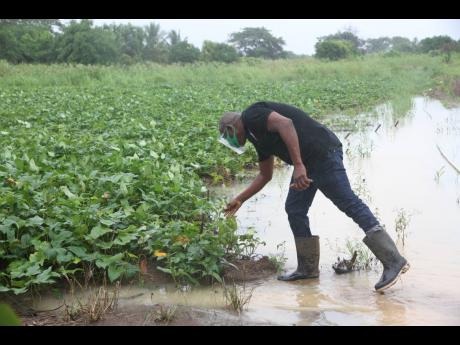Clarendon farms among hardest hit by flood rains – Green
Kellits Councillor Noel Nembhard believes it will be a rough road to recovery for Clarendon farms that took a hit during recent heavy rains with many persons now set to have a not-so-merry Christmas.
Nembhard, a farmer himself, painted a dire picture as Agriculture Minister Floyd Green and a team from the Rural Agricultural Development Authority (RADA) toured the Kellits area on Wednesday, assessing flood damage across the parish.
He said that although farmers were feeling down, the tour by agriculture officials had given them some hope.
“I’m living in the community. I hear their cries every morning,” Nembhard said.
“A lot of farmers sow to reap for Christmas, and I know most of them not going to have a good Christmas,” he told The Gleaner, pointing out that crops such as lettuce, cabbage, and pak choi were among the worst affected.
‘Millions’ lost
While unable to give an estimate of the losses, the councillor said that Kellits would “take a financial hit” as it is a strong farming area and everyone was cultivating for Christmas.
“At this time, all who never [usually] farm farming for Christmas, so they get a big lick,” he said, “millions of dollars.”
Trying to rebound, some farmers had already cleared and prepared their fields for planting once more.
Commenting on this kind of resilience, Nembhard described the farmers as “tough” and prepared for “these type of things”.
Green, who toured communities such as Ebony Park, Bog Hole, Mason River, and Kellits, said Clarendon was one of the hardest hit parishes.
“Right across the parish, there is tremendous devastation. Most of our farmers have lost quite a lot, some with contractual arrangements that are now in jeopardy because of the fallout from the rain,” he told The Gleaner.
Vegetable farms in Bog Hole were virtually wiped out. It is a similar story for some of the other communities.
“What we have found is that the rain had a severe impact on the agricultural sector and severe impact on Clarendon. ... People might not know, but Clarendon is responsible for a significant amount of our vegetable production. So, you know, clearly, there are consequences as a result of the fallout,” Green said.
Last weekend, Green said that preliminary estimates showed the agriculture sector taking a $2-billion hit from the recent adverse weather. He said that figure would now have to be revisited as with the continuing rains, the losses are likely to climb.
“When you thought that person would have been able to salvage some crops, they were unable to because they were unable to go out. So we are gonna have to refine that figure Tuesday in Parliament and do our assessment,” he said.
Green shared, too, that RADA CEO Peter Thompson had already made an emergency allocation of $15 million in relief to be shared among farmers in the hardest hit parishes of Clarendon, Manchester, and St Elizabeth to facilitate the sourcing of planting materials.

